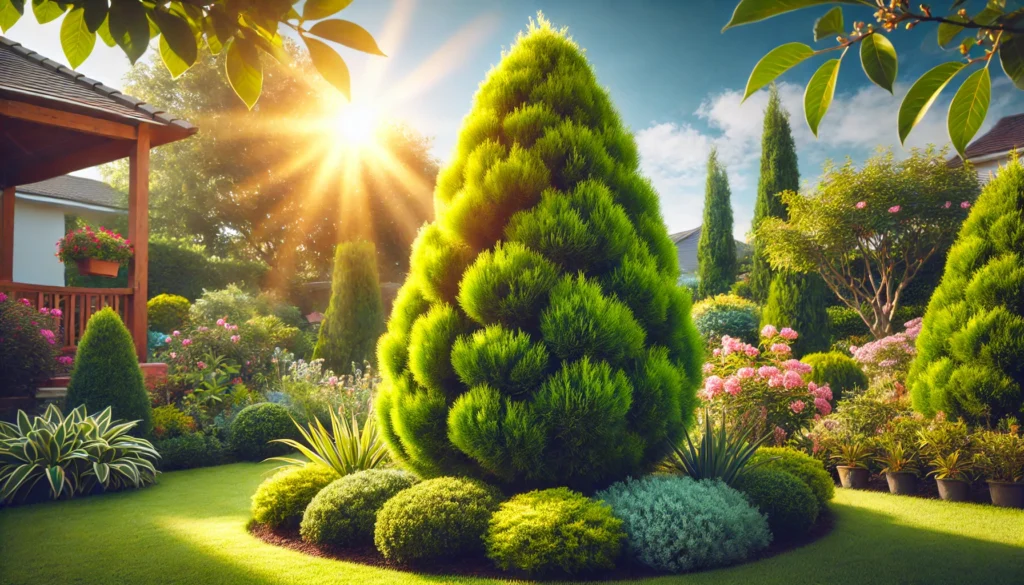
Juniper Tree Fertilizer: The Best Options for Healthy Growth and Vibrant Foliage
Are you struggling to keep your juniper tree healthy and vibrant? One of the most common reasons junipers fail to thrive is improper fertilization. Choosing the right juniper tree fertilizer is essential for promoting strong roots, lush greenery, and overall tree health. But with so many options on the market, it can be hard to know where to start.
In this guide, we’ll walk you through everything you need to know about fertilizing your juniper tree. From understanding its nutritional needs to selecting the best fertilizer type for optimal growth, you’ll find practical tips and expert advice to help your juniper flourish. Keep reading to discover how the right fertilizer can transform your tree!
Table of Contents
ToggleWhy Fertilize Your Juniper Tree? 
Fertilizing your juniper tree is crucial to ensure it thrives and remains healthy throughout the year. Just like any plant, junipers need a balanced supply of nutrients to grow strong and vibrant. Here’s why fertilization is essential for your juniper’s well-being.
1. Promotes Healthy Growth 
Fertilizer provides essential nutrients like nitrogen, phosphorus, and potassium that are vital for your juniper’s growth. These nutrients support the tree’s ability to develop strong roots, lush foliage, and overall resilience. Without proper fertilization, your juniper might show signs of stunted growth or weak branches.
2. Enhances Vibrant Foliage 
Junipers are known for their striking, evergreen foliage, which can range from deep green to blue or yellow tones. Regular fertilization ensures the tree has the energy it needs to produce rich, vibrant leaves. Fertilizer boosts chlorophyll production, which gives your juniper its healthy color and enables it to photosynthesize efficiently.
3. Improves Disease Resistance 
A well-fed juniper is better equipped to fend off pests and diseases. Fertilizing strengthens the tree’s immune system, making it more resilient against common threats like fungal infections, pests, and environmental stress. Healthy trees are less likely to succumb to these issues.
4. Supports Root Development 
The roots are the foundation of your juniper, and proper fertilization helps them grow deep and strong. A robust root system ensures the tree can better absorb water and nutrients, leading to improved drought resistance and overall vitality.
5. Restores Nutrients in Depleted Soil 
Over time, soil can lose its natural nutrients, especially if the same area is repeatedly planted. Fertilizing replenishes these essential nutrients, giving your juniper the best chance to thrive. This is especially important for trees in containers or urban environments with less nutrient-rich soil.
By fertilizing your juniper tree regularly, you’re setting it up for long-term health, beautiful foliage, and strong, sustained growth. With the right type of fertilizer and timing, your juniper will continue to impress for years to come!

Signs Your Juniper Tree Needs Fertilization
Fertilizing your juniper tree is essential to ensure its continued health and vibrant foliage. But how do you know when it’s time to give your tree a nutrient boost? Let’s dive into the common signs that indicate your juniper tree could benefit from fertilization.
1. Yellowing Needles or Foliage 
If you notice that the needles of your juniper are turning yellow, it could be a sign of nutrient deficiency. Lack of nitrogen, iron, or other essential nutrients can cause this.
- What to do: Fertilize your tree with a balanced, slow-release fertilizer to restore its nutrient levels. A fertilizer rich in nitrogen is a good choice for promoting healthy, green growth.
2. Stunted Growth 
When your juniper tree’s growth slows down or it’s not growing as vigorously as it used to, it may be lacking essential nutrients like phosphorus, which support root development.
- What to do: Apply a balanced fertilizer that includes phosphorus to stimulate growth and encourage a stronger root system.
3. Sparse Foliage or Thin Branches 
If the branches of your juniper seem thin or sparse, it may indicate that it’s not getting the necessary nutrients to support its overall structure.
- What to do: Use a slow-release fertilizer designed for trees and shrubs to encourage fuller, healthier foliage and stronger branch growth.
4. Poor Foliage Color or Lack of Vibrancy 
Healthy junipers typically display vibrant green or bluish foliage. If the color seems dull or faded, this could be a sign that your tree is struggling with nutrient deficiencies.
- What to do: Apply a fertilizer with micronutrients, such as iron and magnesium, which can help restore vibrant color and promote overall plant health.
5. Slow or Delayed Spring Growth 
If your juniper tree is slow to bud or show new growth in the spring, it might not have enough nutrients to kickstart the growing season.
- What to do: Fertilize in early spring, right before the growing season starts, to give your juniper the energy it needs for a strong start.
Fertilizing your juniper tree at the right time can make a huge difference in its health and appearance. Keep an eye on these signs, and with the right fertilizer, you’ll help your tree thrive!
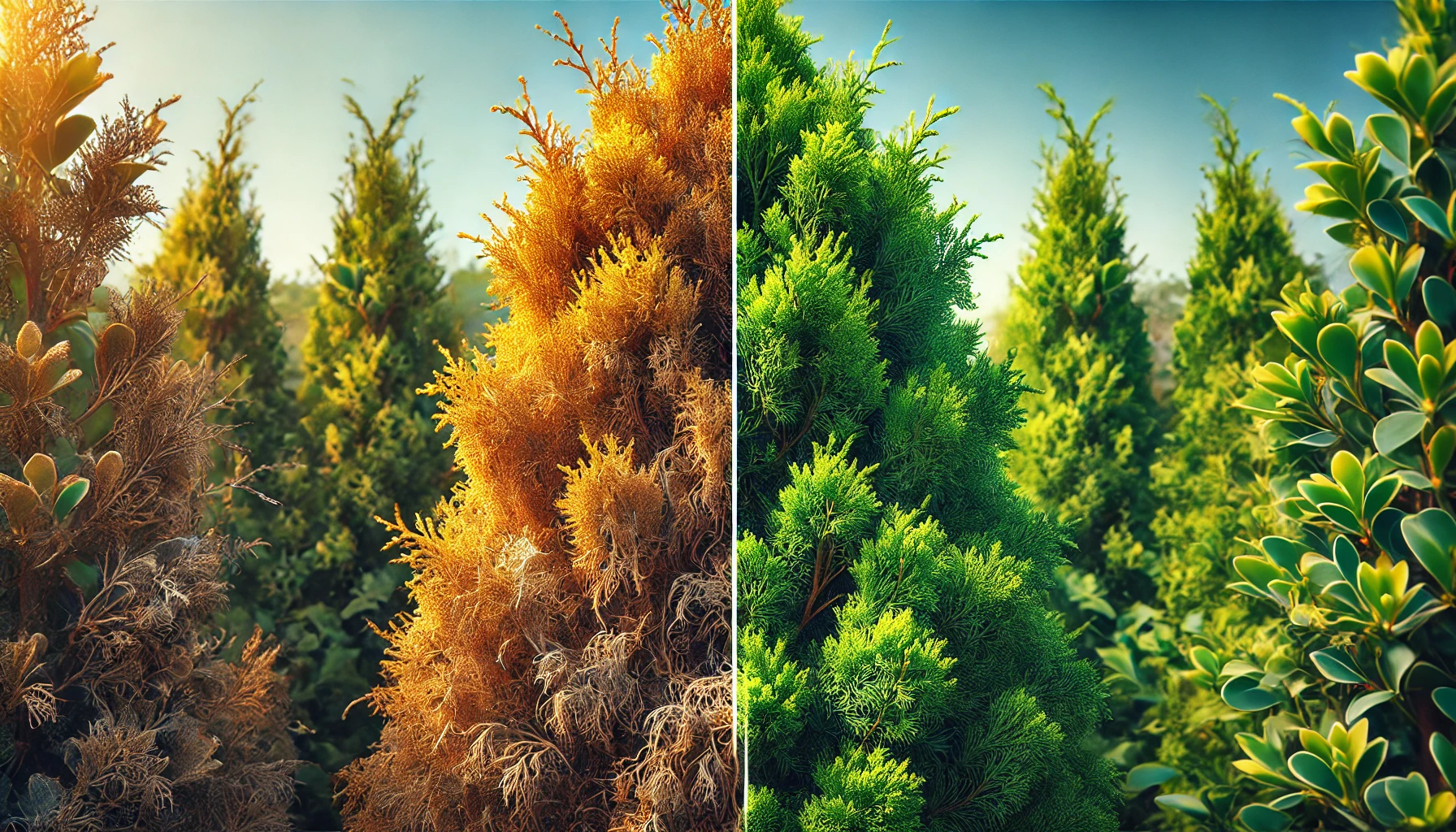
Types of Juniper Tree Fertilizer
Choosing the right fertilizer for your juniper tree is key to promoting healthy growth and vibrant foliage. Different types of fertilizers cater to various needs, whether you’re aiming for more robust growth or better color. Let’s break down the best options available.
1. Slow-Release Fertilizers 
Slow-release fertilizers gradually release nutrients over time, ensuring a steady supply to your juniper tree. They’re great for providing long-term care with minimal effort.
- How to use it: Apply in early spring, just as the growing season begins. This type of fertilizer works well for both ground-planted and potted junipers, as it reduces the risk of over-fertilizing.
2. Liquid Fertilizers 
Liquid fertilizers are fast-acting and perfect for giving your juniper a quick nutrient boost. They’re ideal for indoor junipers or when the tree shows signs of nutrient deficiency.
- How to use it: Dilute the fertilizer according to package instructions and apply it directly to the soil. It’s best used during the active growing season, typically in the spring and summer.
3. Organic Fertilizers 
For a more eco-friendly option, organic fertilizers like compost or well-rotted manure can enhance the soil without relying on synthetic chemicals. They provide a rich source of nutrients and improve soil structure over time.
- How to use it: Apply organic fertilizers in early spring and work them gently into the soil around the base of the tree. Organic options are slower to take effect but benefit the long-term health of the tree.
4. Balanced Fertilizers 
Balanced fertilizers contain equal amounts of nitrogen (N), phosphorus (P), and potassium (K), which are essential for overall plant health. This type is great for general maintenance, ensuring your juniper gets the nutrients it needs in the right proportions.
- How to use it: Apply balanced fertilizer in moderation, especially during the growing season. This is especially useful for trees that are just starting out or are experiencing slow growth.
5. High-Phosphorus Fertilizers 
If your juniper is struggling to bloom or you want to encourage a vibrant display of color, a high-phosphorus fertilizer can help. Phosphorus promotes root development and flowering.
- How to use it: Apply in early spring before the growing season. Be careful not to overdo it, as too much phosphorus can cause harm to the tree’s overall health.
By choosing the right fertilizer for your juniper tree, you can ensure a healthier, more vibrant plant that thrives in its environment. Whether you go for a slow-release option, a liquid boost, or an organic alternative, these fertilizers will help your juniper grow strong and beautiful.
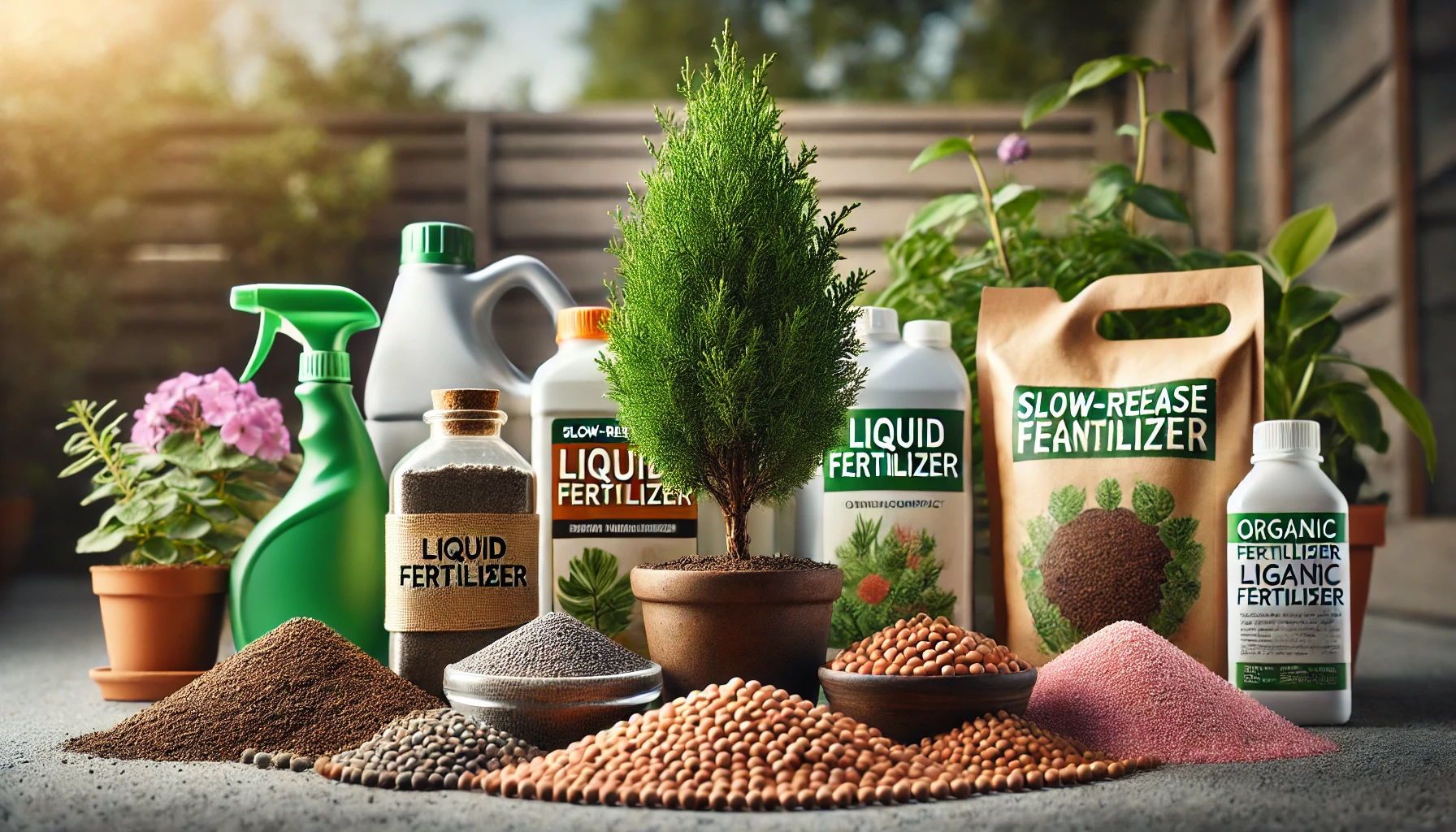
Best Fertilizer Options for Juniper Trees
Choosing the right fertilizer for your juniper tree is essential for healthy growth and vibrant foliage. Whether you’re caring for a full-sized juniper or a bonsai tree, providing the right nutrients ensures your tree thrives. Here’s a breakdown of the best fertilizer options for juniper trees.
1. Slow-Release Fertilizer 
Slow-release fertilizers are ideal for junipers because they provide a steady supply of nutrients over time without the risk of over-fertilizing. These fertilizers release nutrients gradually, reducing the need for frequent applications.
- Best For: Regular maintenance and feeding throughout the growing season.
- Example: Osmocote Smart-Release Flower & Vegetable Fertilizer.
2. Balanced Fertilizer (10-10-10) 
A balanced fertilizer with an equal ratio of nitrogen (N), phosphorus (P), and potassium (K) is a great option for junipers, providing the essential nutrients for overall health. It supports foliage growth, root development, and disease resistance.
- Best For: General care and promoting healthy growth.
- Example: Miracle-Gro Water Soluble All Purpose Plant Food.
3. Organic Fertilizers 
If you prefer organic options, look for fertilizers made from natural ingredients like compost, fish emulsion, or seaweed. These options are environmentally friendly and improve soil health over time.
- Best For: Sustainable gardening and environmentally-conscious care.
- Example: Dr. Earth Organic Fertilizer.
4. Specialized Bonsai Fertilizer 
For junipers grown as bonsai trees, specialized bonsai fertilizers are formulated to meet the unique needs of small, potted trees. These fertilizers often have a balanced mix of nutrients and are designed to support compact growth and root health.
- Best For: Indoor bonsai junipers or potted junipers.
- Example: Bonsai Jack Complete Fertilizer.
5. Liquid Fertilizer 
Liquid fertilizers are fast-acting and easy to apply. They’re great for giving your juniper an immediate nutrient boost, especially during the growing season. Be sure to dilute it to avoid over-fertilizing.
- Best For: Quick nutrient uptake and feeding during active growth periods.
- Example: FoxFarm Grow Big Liquid Concentrate Fertilizer.
6. Iron Supplement for Yellowing 
If your juniper is showing signs of yellowing leaves (chlorosis), it might be lacking iron. Using a specialized iron supplement can help correct this issue and encourage healthy, green growth.
- Best For: Correcting iron deficiency in junipers.
- Example: Espoma Organic Iron Tone.
Tips for Fertilizing Junipers:
- Frequency: Fertilize your juniper in early spring before the growing season begins, and again in mid-summer. Avoid fertilizing in the fall, as this can encourage new growth that may not survive the winter.
- Application: Always follow the manufacturer’s instructions to avoid over-fertilizing. Too much fertilizer can harm the tree and cause leaf burn.
By selecting the right fertilizer and applying it correctly, you’ll help your juniper tree grow strong and maintain its beautiful, vibrant foliage year-round.
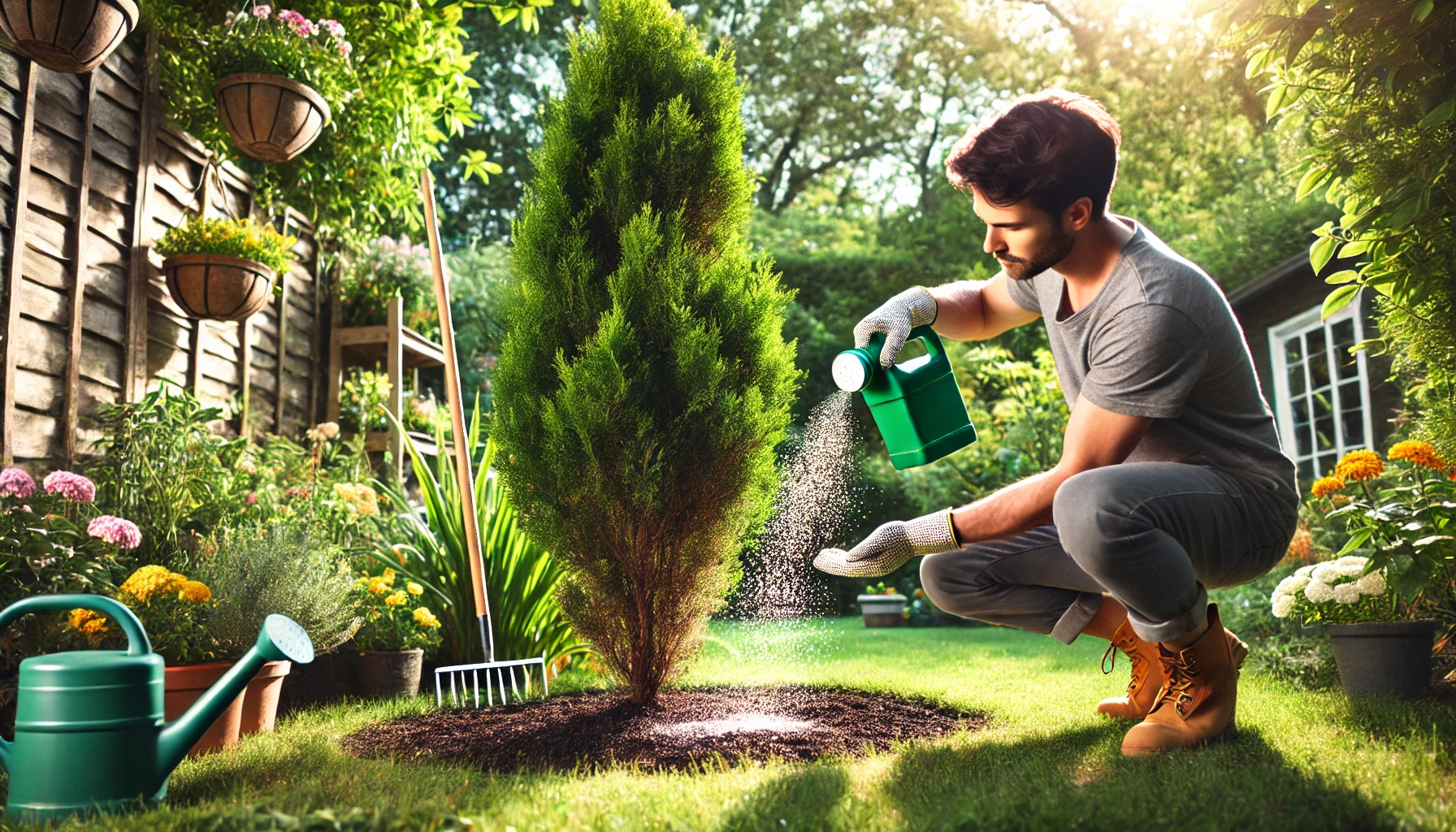
How and When to Apply Juniper Tree Fertilizer
Fertilizing your juniper tree is crucial for promoting healthy growth and vibrant foliage. Whether you’re growing your juniper outdoors or as a bonsai indoors, proper fertilization will help it thrive. Let’s dive into the best practices for applying fertilizer to your juniper.
1. When to Apply Juniper Tree Fertilizer 
The timing of fertilizer application is just as important as the fertilizer itself. Junipers grow most actively during the spring and early summer, so this is the best time to feed them.
- Spring (March to April): Begin fertilizing when the tree comes out of dormancy. The warmer temperatures signal the start of the growing season.
- Early Summer (June): If your juniper is still actively growing, a second round of fertilizer will support continued healthy development.
- Avoid Late Fall or Winter
: Junipers typically slow down their growth during the colder months, so avoid fertilizing during this time to prevent unnecessary stress on the plant.
2. How to Apply Juniper Tree Fertilizer 
Choosing the right type of fertilizer and applying it correctly ensures the nutrients reach your tree’s roots effectively.
- Choose a Balanced Fertilizer: Opt for a slow-release, balanced fertilizer with equal proportions of nitrogen (N), phosphorus (P), and potassium (K). This provides essential nutrients for overall health and root development.
- Organic Options: Organic fertilizers like compost or well-aged manure are excellent choices for a natural boost, enriching the soil and promoting microbial health.
- Application Method: Follow the manufacturer’s instructions on the label. Generally, sprinkle the fertilizer evenly around the base of the tree, about 6–12 inches from the trunk. For bonsai trees, use a diluted liquid fertilizer for more controlled feeding.
3. How Much Fertilizer to Use 
It’s important not to over-fertilize your juniper, as this can lead to nutrient imbalances and burn the roots. Start with a small amount and increase gradually as needed.
- For Grounded Junipers: Apply fertilizer once every 6-8 weeks during the growing season, making sure to water your tree well after each application.
- For Bonsai Trees: Use a diluted liquid fertilizer every 2–3 weeks during the growing season, as indoor trees have limited access to nutrients from the soil.
By following these simple guidelines, your juniper tree will have the nutrients it needs for strong, healthy growth. A well-fed tree will reward you with lush, green foliage and a sturdy structure for years to come!
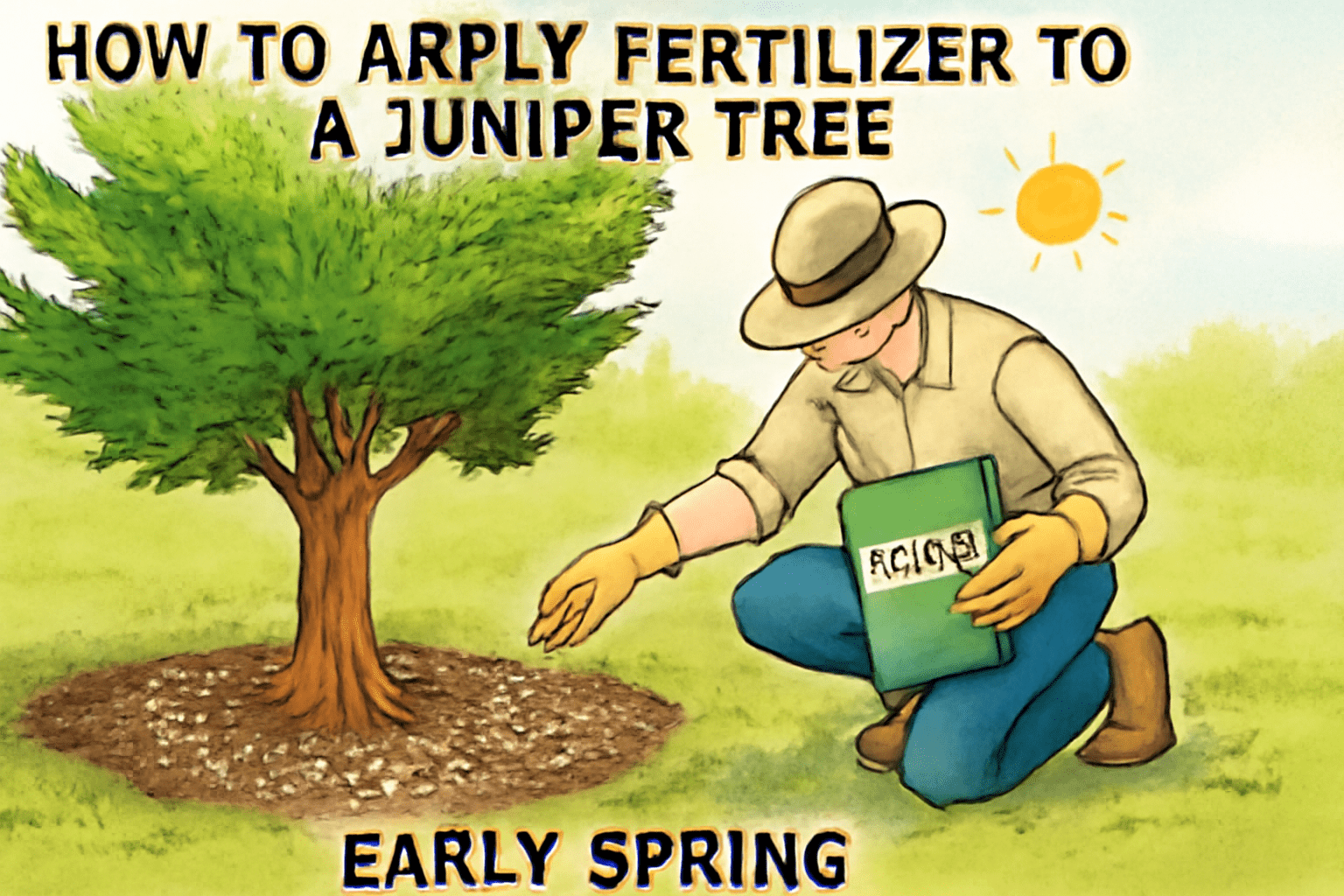
Common Fertilizer Mistakes and How to Avoid Them
Fertilizing your juniper tree is essential for healthy growth and vibrant foliage, but using the wrong type or applying it improperly can do more harm than good. To help you get the best results, let’s go over some common fertilizer mistakes and how to avoid them.
1. Over-Fertilizing 
One of the most common mistakes is using too much fertilizer. This can lead to nutrient burn, where the tips of the leaves turn brown and crispy.
- How to avoid it: Always follow the recommended dosage on the fertilizer label. It’s better to under-fertilize than overdo it. Apply fertilizer every 4-6 weeks during the growing season, and reduce or stop during the dormant period in winter.
2. Using the Wrong Fertilizer Type 
Not all fertilizers are suitable for junipers. Using a fertilizer with a high nitrogen content can promote excessive foliage growth at the expense of root development, which weakens the tree.
- How to avoid it: Choose a balanced, slow-release fertilizer with an equal ratio of nitrogen (N), phosphorus (P), and potassium (K), such as a 10-10-10 mix. This ensures that your juniper gets a steady supply of all essential nutrients.
3. Fertilizing During Dormancy 
Fertilizing your juniper tree during its dormant period (typically in winter) can interfere with its natural growth cycle and potentially damage the tree.
- How to avoid it: Only fertilize your juniper during its active growing season, typically in spring and summer. Stop fertilizing when the tree is not actively growing, usually in the fall and winter months.
4. Not Watering After Fertilizing 
Fertilizer can cause a build-up of salts in the soil, which can be harmful to your juniper if not properly watered in.
- How to avoid it: After applying fertilizer, always water the soil thoroughly. This helps to dissolve the fertilizer and ensures that the nutrients are absorbed by the roots without causing damage.
5. Using Only Chemical Fertilizers 
While chemical fertilizers work quickly, they can lead to long-term soil depletion and harm beneficial microorganisms that your juniper needs.
- How to avoid it: Consider using organic fertilizers like compost, fish emulsion, or seaweed extract. These provide slow-release nutrients and improve soil health over time, supporting the overall well-being of your juniper tree.
By avoiding these common fertilizer mistakes, you can keep your juniper tree healthy, vibrant, and growing strong. 
Organic vs. Synthetic Fertilizers for Juniper Trees
When it comes to feeding your juniper tree, choosing the right fertilizer is key to promoting healthy growth and vibrant foliage. But with so many options available, you might be wondering: Should you go organic or synthetic? Let’s break down the pros and cons of both to help you make an informed decision.
Organic Fertilizers 
Organic fertilizers are made from natural materials, like compost, manure, or bone meal. They work slowly but steadily, improving soil health over time.
- Pros:
- Soil health: Organic fertilizers improve the overall structure and microbial activity of the soil, leading to healthier, more resilient plants.
- Long-term benefits: These fertilizers release nutrients slowly, providing a consistent supply over time.
- Eco-friendly: They are better for the environment, as they’re free from synthetic chemicals and pesticides.
- Cons:
- Slower results: Organic fertilizers take time to show visible effects, so you may not see immediate results.
- Cost: Organic options can be pricier than synthetic ones.
Synthetic Fertilizers 
Synthetic fertilizers are chemically manufactured to provide a quick nutrient boost to your juniper tree. They are typically packed with essential nutrients like nitrogen, phosphorus, and potassium.
- Pros:
- Fast results: Synthetic fertilizers quickly release nutrients, helping your juniper tree grow faster and greener.
- Precision: You can easily control the nutrient composition, tailoring it to your tree’s specific needs.
- Cons:
- Soil degradation: Over time, synthetic fertilizers can reduce soil fertility and disrupt the natural microbial balance.
- Risk of over-fertilization: Because they release nutrients quickly, there’s a higher risk of over-fertilizing, which can harm the tree.
Which Should You Choose? 
For most juniper trees, a balance of both might be the best option. Organic fertilizers are great for maintaining soil health and providing long-term benefits, while synthetic options can be used for quick nutrient boosts when your tree needs a little extra help.
To ensure the health of your juniper tree, try combining both types over time—use organic fertilizer during the growing season and synthetic fertilizers during periods of rapid growth. This combination will give your tree the best of both worlds: steady, sustainable growth with the ability to respond quickly when needed.
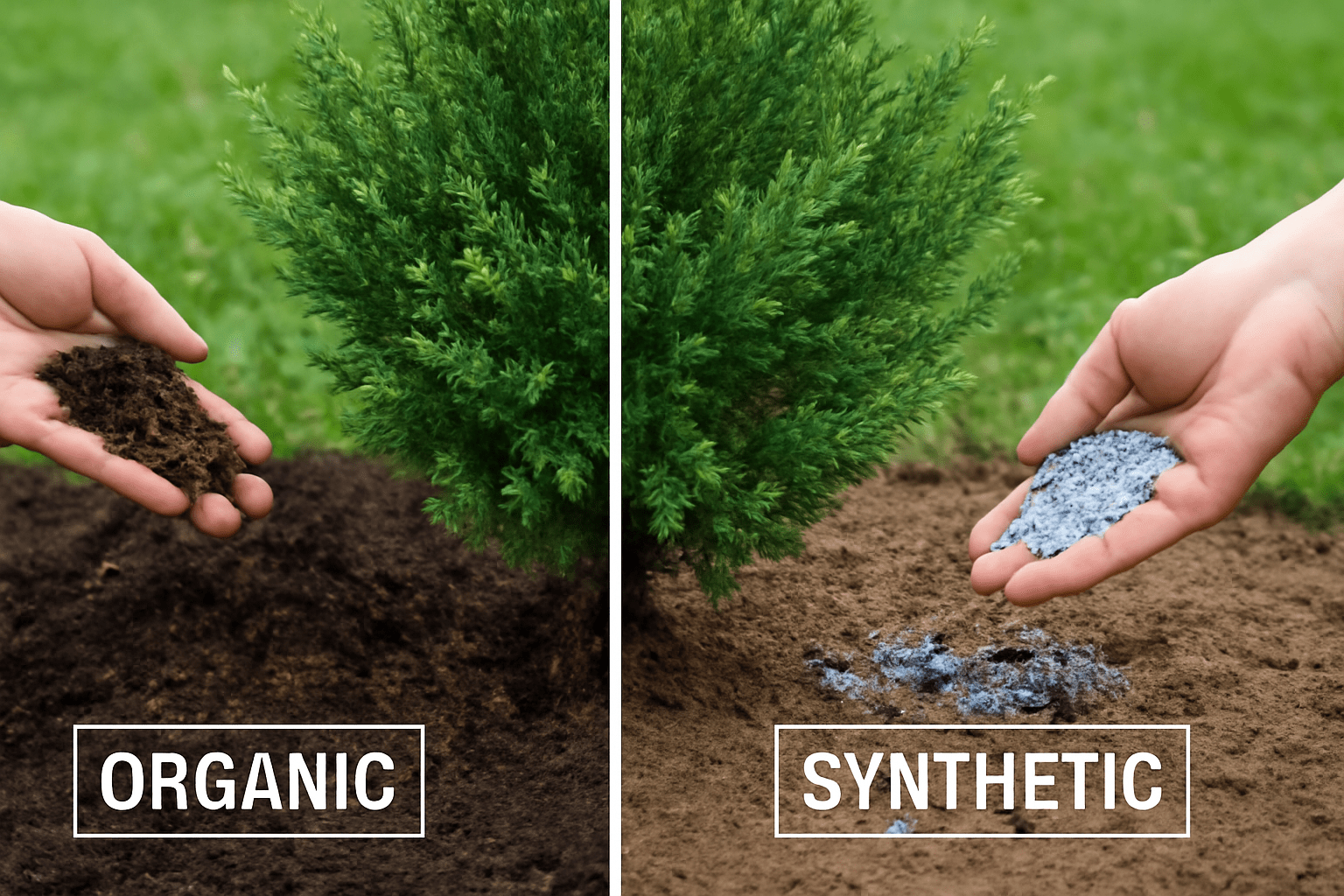
Conclusion
Fertilizing your juniper tree is essential for promoting strong growth, vibrant foliage, and overall health. By choosing the right juniper tree fertilizer and applying it correctly, you’ll be able to support the tree’s nutritional needs throughout the year. Remember, the key is consistency and selecting a fertilizer that aligns with your tree’s specific requirements—whether you opt for a balanced NPK, organic, or slow-release formula.
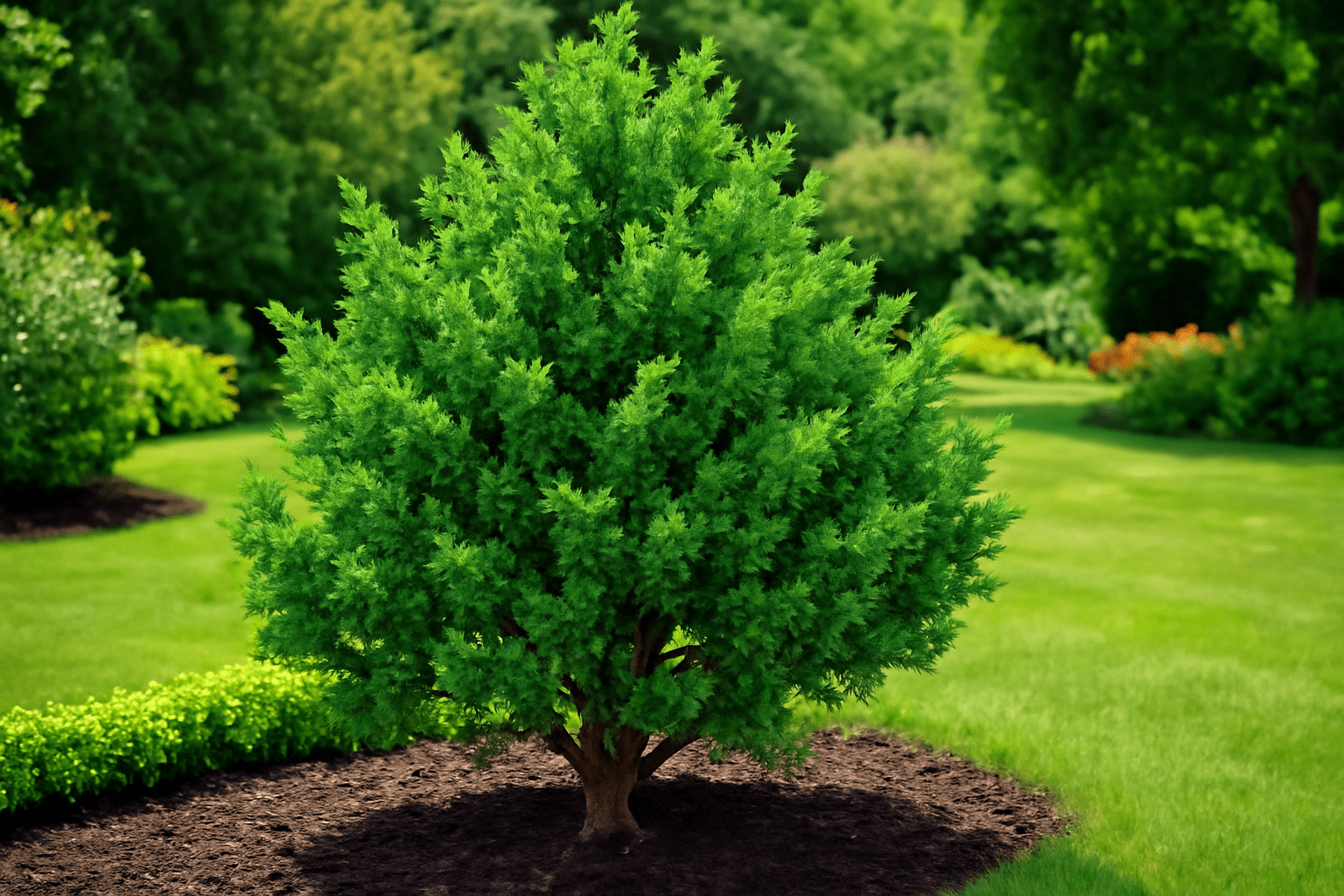
With the practical tips and insights shared in this guide, you’re now equipped to keep your juniper thriving for years to come. Take the time to care for your tree, and you’ll enjoy its beauty and health as it flourishes in your garden or landscape. Happy gardening!
Frequently Asked Questions(FAQ)
What is the best fertilizer for juniper trees?
The best fertilizer for juniper trees is a balanced NPK fertilizer with a ratio like 10-10-10, which provides equal amounts of nitrogen, phosphorus, and potassium. Slow-release granular fertilizers are ideal, as they provide nutrients over time without overwhelming the tree.
How often should I fertilize my juniper tree?
Juniper trees typically need fertilizing twice a year—once in early spring when growth begins, and again in late fall to support root growth during the winter. Avoid over-fertilizing, as it can damage the tree or lead to excessive, weak growth.
Can I use regular plant fertilizer on my juniper tree?
While you can use regular plant fertilizer, it’s best to choose one formulated for conifers or trees to meet the specific needs of junipers. Regular fertilizers may not provide the right balance of nutrients, which can impact the health of the tree in the long term.
How do I apply fertilizer to my juniper tree?
For granular fertilizer, sprinkle it around the base of the tree and water thoroughly to help it penetrate the soil. For liquid fertilizers, dilute according to package instructions and apply with a watering can directly to the soil. Always follow the manufacturer’s recommendations for amounts and frequency.
Is organic fertilizer better for juniper trees?
Organic fertilizers, such as compost or fish emulsion, can be great for junipers because they improve soil health and provide slow, steady nutrition. While they work well, they may take longer to show results compared to synthetic fertilizers but are better for long-term sustainability.
Why are the needles of my juniper tree turning yellow after fertilizing?
Yellowing needles after fertilizing could indicate over-fertilization or improper application. Too much nitrogen can cause the roots to burn, leading to nutrient imbalances and stress on the tree. Reduce the fertilizer amount and ensure it’s being applied at the correct time.
Can I fertilize my juniper tree during the winter?
It’s generally not recommended to fertilize juniper trees during the winter when the tree is dormant. Fertilizing during dormancy can stress the tree and prevent it from properly absorbing the nutrients. Stick to spring and fall fertilization for the best results.
Should I use liquid or granular fertilizer for my juniper tree?
Both liquid and granular fertilizers are effective, but granular fertilizers offer a slower, more consistent release of nutrients, making them ideal for junipers. Liquid fertilizers work faster, but they need to be applied more frequently. Choose based on your preference and the needs of your tree.

